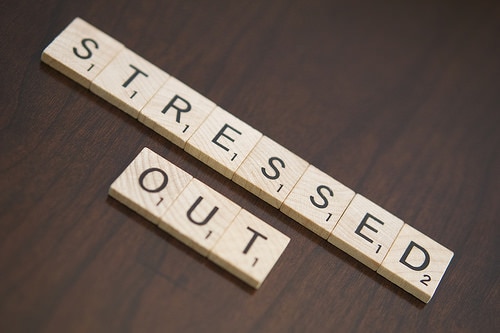
Midterms are coming up, and you know what that means…late nights studying, loading up on the caffeine, and stress.
Today, I’m here to let you know that everything will be okay if you put down your books for a few minutes to read this article. Actually, everything will also be okay if you put your books down for a few hours and take a break, whether that means taking a nap or grabbing coffee with your friends. But read this first.
{RELATED POST: 15 Proven Ways to Destress When It Feels Like the World is Ending}
Below, I’m going to delve deep into the stressed-out world of college student culture. I’ll also tell you about my experience with stress and how I overcame it. So block out an estimated nine minutes and read this… your brain and body will thank you.
Table of Contents
What is Stress?
Before we move on to healthy ways to manage stress and I convince you to pack up your things from the library, let’s talk for a sec about what stress actually is. Stress is a normal, biological response to stressors. Stressors in our environment cause us to respond, physically, in order to deal with them appropriately.
In short, it’s normal to be stressed. We need stress to survive, otherwise we wouldn’t assess certain situations properly. (If you are in danger, for example, you need your body to generate the fight-or-flight response to keep you safe.) What’s not okay is to constantly be holding on to that stress. Increased levels of cortisol (“the stress hormone”) can wreak havoc on your body — not just one part of your body, but all of it, from your brain to your liver and more. So stress, in small doses, is fine. But living your life in a constant state of stress is not. That’s where problems arise.
Stress as a Badge of Honor

While we’re talking about stress, I also want to remind you that it’s okay to not be stressed. The fact that I even need to emphasize this speaks volumes about our culture.
We’re living in the most stimulating, fast-paced society that has ever existed in the history of the human race. And sometimes, it’s hard to turn off that little voice in your head that tells you to finish one more problem set before you sleep or to add one more extracurricular activity to your schedule. There is no such thing as free time anymore because we’re scheduling ourselves to the brim, and sometimes, we even romanticize the idea of a busy, over-caffeinated lifestyle. Let me repeat: It’s OK to reject this idea and embrace NOT being stressed. In fact, it’s healthy to do this.
Mental health and stress are intricately linked together, and it’s important to remember that feeling overwhelmed doesn’t mean you can’t handle something or that you’re weak. It means that you just need to take a step back and look at the bigger picture for a while. You need to take care of yourself, and striving to NOT be stressed is part of that self care.
So how do you handle stress?
Obviously, in a fast-paced college environment, we’re going to be stressed sometimes. The key here is not just to handle the stress but to handle it healthily. We all have that one friend who “works hard, plays hard” and wakes up Sunday morning with the worst hangover ever. A drink or two (or maybe one more) won’t kill you but if alcohol is your main outlet, you may want to stay in and schedule a Netflix date, instead. Alcohol and drug abuse are widespread issues in college, and you don’t want to replace one problem in your life with another.
There are a bunch of ways that you can deal with stress but remember, what works for one person may not be what works for you. So pick and choose what helps, and don’t be afraid to try out other things not covered. Sometimes, you really do just need a night out. Other times, you may need to stay in, plant yourself in your chair, and get organized…
A great way to let go of your stress is a dorm room spa treatment. Choose a mask for your dehydrated winter skin or just sit back, catch up on your favorite show, and give yourself a mani. I’m a big proponent of looking your best to feel your best. That doesn’t mean you need to go out and splurge on every cult skincare product, but it does mean that you need to take time for yourself. Your wellbeing is more important than a 4.0 — after all, you’re not going to be able to enjoy the fruits of your labors if you’re feeling awful.
If you’re sleep-deprived, seriously think about getting some shut eye. Different intervals of napping will give you varied benefits. If you just need a boost of energy, 10-20 minutes is ideal. An hour and a half is roughly equal to one REM cycle and can help improve your memory and creativity. And some people swear by “nappuccinos” — gulp down a cup of coffee before your 20 minute nap (which is how long your body takes to metabolize caffeine), and you’ll wake up feeling the benefits of a nap and caffeine. But remember, coffee isn’t a replacement for sleep.

Speaking of sleep, if you’re staying up past 1 am, you may want to rethink your sleep schedule. If you’re a natural night owl, this might not apply to you, but for many people, it’s great to start the morning early. You can use this extra time to complete some homework or plan out your day. There’s honestly nothing more stressful than waking up five minutes before an exam and running to class disheveled and on an empty stomach.
You’re probably tired of hearing about exercise as a cure-all but there are studies linked to decreased levels of stress in people who do yoga. (That’s part of why we recommend that all college students do yoga.) Plus, all you really need is a yoga mat and some Youtube videos, if you don’t have access to classes. Tara Stiles makes some of my favorite workouts and sequences, and there are videos for beginners all the way up to those further along in their practice.
I know that everyone tells you to “tune out” for a while and just put your phone down, shut off your computer, etc. But guess what? It really works. This podcast recently talked about the harmful effects of information overload. I won’t go so far as to tell you that you have to do the Infomagical challenge but I do want to note that the time you spend on your devices can likely be used more effectively, and social media has a way of stressing you in different ways than school does. So stop compulsively looking through pictures of your ex and use that time to catch up on sleep or do something nice for yourself.
My Experience with Stress
Telling you that you’re not alone and showing you are two very different things, so before we go, I’m going to share my story.
Right now, I’m a sophomore in college, and a Spanish and Medical Anthropology double major on the pre-medical track. I can only remember a few days even as far back as high school when I wasn’t stressed, and it isn’t much better now. What has changed, though, is how my stress manifests and how I deal with it. Last year, I had a wakeup call that changed my approach.
During the first semester of my freshman year, I thought I could get by on little to no sleep. After long days of classes, I would stay out late, making new friends, meeting new people, doing new things…and I was constantly overstimulated. I was overworked and exhausted, and when I did get some down time, I was asleep. And that was when I had my first panic attack.
After what I experienced with my first (and subsequent) panic attacks, I finally decided that my mental health was more important than achieving a 4.0. So I sat down and re-evaluated what was truly important and what wasn’t. Prioritizing and learning to say “no” were two very important things for me — I was constantly overbooking myself and agreeing to do things that I didn’t have time for. I started using my time more deliberately, for the things that mattered most, and I soon found I had time left over: time to read or browse Youtube without feeling like I was procrastinating, time to just listen to a few podcasts and sip on coffee…time to breathe.
And the good grades just followed. I wasn’t doing work at ridiculous hours and I wasn’t pulling all-nighters. That meant that when I was in lecture, I could absorb information and when I was studying, I wasn’t half asleep. And when I did (and still do) get less-than-stellar grades, I reminded myself that it wasn’t the end of the world. I also reminded myself that it was okay not to finish a problem set but it wasn’t okay to skip a day’s worth of meals.
That’s not to say that I don’t get stressed now — I still am constantly thinking about the next paper or that obscure Organic Chemistry mechanism. But I did make some much needed changes to stop living in a constant state of worry and panic. And my life is better for it.
More CF articles on stress in college:
We are primarily a fashion blog, yes, but we’ve written extensively about this subject because, well, it’s a constant part of college life. Here are some other CF posts that are more tip-based, if you’re looking for concrete ideas to help you unwind:
- 9 Ways to Stay Sane During Finals Week – Includes a few unconventional tips, from using aromatherapy to the best stress-relieving teas.
- 3 Simple Ways to Deal with Stress in College – Quick tips you can use right now to feel a little less stressed in under an hour.
- 4 Ways to Ease Midterm Stress – Your basic anti-stress guide, including study habits to help you stay organized.
So what about you?
Are you going to try any of these tips? Do you think you need to sit down and think about your stress? And how do you handle your stress — what works for you? Let me know in a comment below so that we can all help each other out!
